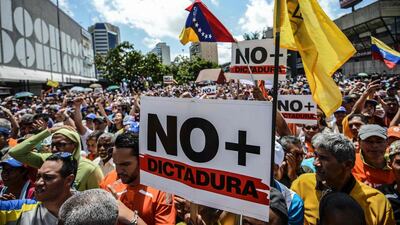In Venezuela, baking pastries can be a crime: wheat is meant to be reserved for cheap bread.
In a slightly different recipe, the country's oil exports are imperilled by its inability to pay for light oil to blend with its cheap heavy crude. Disaster has been cooking in Caracas for some time, in what might be the oil market's next upset.
The country’s economy has been in slow collapse for several years, accelerated by the fall in oil prices. The IMF estimates inflation this year at 1,660 per cent and Venezuelans are suffering shortages of food and basic medicines. Oil service companies such as Schlumberger are cutting back activities because they are not being paid.
Along with the economic crisis goes a political one. The legislature has been threatening to withhold the approval of oil joint ventures that the president, Nicolas Maduro, has offered in attempts to raise hard cash. The politicised supreme court overruled it, in a move the opposition considered to be approaching dictatorship, but has now been forced to back down.
This dish also suffers from too many cooks. The country’s troubles draw in three world powers, as investors, financiers and customers of Venezuelan oil: China, Russia and the United States. Their interests are at odds.
Under the former president Hugo Chavez, China was seen as the key partner. By early last year, Caracas owed the Chinese about US$30 billion in oil-backed loans, but now it is about 9 million barrels behind in shipments, with reasons including its inability to pay for ship cleaning and port fees.
More recently, it is Russia that has become the leading foreign oil investor. It entered in a major way in 2008 and since then the state champion Rosneft has consolidated its influence. Its biggest venture, PetroMonagas, exploits the Orinoco Belt’s thick, extra-heavy crude. Last year, Rosneft paid $500 million to increase its stake to 40 per cent, the legal maximum. It was this, and an offer of 10 per cent in the nearby Petropiar, that brought the legislature’s challenge.
Moscow’s advocacy of production cuts has probably been more welcome to Venezuela than any other Opec member. Venezuela agreed to a target of 1.972 million bpd production, a 95,000 bpd cut, not onerous given that output has been steadily sliding anyway. It was slightly over producing in February but projections see natural decline taking it to 1.7 million bpd to 1.8 million bpd by the end of this year, taking some strain off other Opec members.
Russia is also the regime’s key financier now. Rosneft alone has lent $4bn to $5bn. Mr Maduro, who in January awarded Russia’s president, Vladimir Putin, the inaugural Hugo Chavez Prize for Peace and Sovereignty, said at the signing of the loan agreement: “We must thank life that Russia and the world have a Vladimir Putin.”
Venezuela owns an important US refining and fuel-retail subsidiary, Citgo, and has pledged half its shares as collateral for the loans from Rosneft. Were it to default, the prospect of the Russian state firm owning American refineries would be political dynamite in Washington.
A further twist comes with next-door Guyana, where ExxonMobil, which the US secretary of state, Rex Tillerson, headed until recently, has found several billion barrels of oil offshore. But Venezuela claims much of western Guyana as its territory, including the adjoining waters, a potential flashpoint and rallying cry for the embattled Maduro government.
China wants stable oil supplies, its loans repaid and a steady market for its exports. Russia welcomes the chance to gain political influence in the US’s hemisphere, and oil investments that one day may pay off or be a source of leverage. The administration of Donald Trump, which has not yet appointed an ambassador, has not defined its policy towards Venezuela.
A default and complete collapse would not benefit any of them. But if Venezuela's oil exports were halted by bankruptcy, strikes or civil unrest, it would do more than the Opec deal to rebalance the market.
Robin Mills is the chief executive of Qamar Energy and the author of The Myth of the Oil Crisis.
business@thenational.ae
Follow The National's Business section on Twitter


